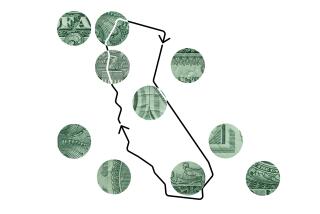Buoyed by Polls, Gephardt Steps Up Campaign in Iowa
- Share via
DES MOINES -- As he campaigns in Iowa, Missouri Rep. Richard A. Gephardt likes to tell crowds about the time a man at Pittsburgh International Airport asked for an autograph for his 6-year-old son.
“This is great,” the man told Gephardt. “My son has autographs from a lot of famous people, but this will be his first autograph from an astronaut.”
Gephardt occasionally still gets mistaken for someone famous, but in Iowa he is starting to be recognized as a top contender in the state’s Democratic caucuses on Jan. 19.
After being overshadowed by the surging popularity of former Vermont Gov. Howard Dean and the late entry of retired Army Gen. Wesley K. Clark into the race, Gephardt’s campaign is feeling reenergized by promising poll numbers and Republican concerns about his potential strength. Gephardt returned to western Iowa for a two-day campaign jaunt this week for the first time since three polls showed he held a slim lead or was in a virtual tie for the lead with Dean.
Gephardt said he is happy about his campaign’s prospects but remains cautious.
“Polls are always helpful, but you can’t get too wound up about them because [the caucuses] are still a long way away,” he said Saturday before speaking to a small crowd at Lil’s Diner in Audubon.
Still, during rallies and town-hall meetings in tiny farming towns surrounded by cornfields, he repeatedly introduces himself by saying: “I’m Dick Gephardt. I’m going to beat George Bush in November 2004.”
By winning the caucuses, the first contest of the primary campaign, Gephardt’s campaign would gain substantial media attention and, possibly, campaign donations, political analysts say.
“We are busting our posterior to win Iowa,” said Bill Carrick, Gephardt’s media consultant.
In Iowa, Gephardt has several advantages over his rivals. He has strong support from unions in a heavily blue-collar state. Gephardt also has solid name recognition. He has represented neighboring Missouri in the House of Representatives for 26 years.
“He is the homeboy,” said Larry Sabato, founder of the Center for Politics at the University of Virginia.
Thus, several analysts believe that if Gephardt can’t win Iowa, his chances of getting the Democratic nomination are slim.
“Iowa is absolutely crucial,” said Stuart Rothenberg, an independent analyst and publisher of the Rothenberg Political Report. “If he loses Iowa, he is toast.”
Gephardt knows that winning Iowa would only be a good beginning to a tough campaign. He won the state’s caucuses in 1988 but lost the Democratic nomination to then-Gov. Michael S. Dukakis of Massachusetts.
This year he’s been running a steady, methodical campaign in Iowa. Day in and day out, he speaks before groups of 40 or 50 people. He tells them he wants to adopt a national health-care plan that would provide coverage for every American.
On Saturday, Gephardt spoke at a historical museum in the town of Harland, population 5,282. About 25 people were there. Behind him, gazing out at his audience were several mounted moose heads and a two-headed stuffed calf.
His staff, unfazed by the small audiences, likes to compare Gephardt to the fabled tortoise that won the race against the hare. Campaign aides have made the turtle a campaign mascot -- decorating campaign documents with a drawing of a smiling turtle and the words “Fear the Turtle.”
They’re also circulating copies of an article by the Washington Post saying that Republican strategists, lawmakers and state party chairmen see Gephardt as the Democratic candidate best suited to beat President Bush in 2004.
According to the Post, Republicans cite Gephardt’s consistent support for the Iraq war, unrivaled support among union leaders and his roots in the Midwest, where many believe the general election will be decided. Gephardt’s health-care plan, experience in Congress and discipline were also mentioned as key factors.
When Gephardt won the Iowa caucuses in 1988, political analysts said he looked stiff and uninspiring. During this campaign, he has injected more emotion and personal stories into his speeches. He often recounts the story about his son, Matt, who overcame cancer when he was 18 months old with the help of a health insurance policy that paid for radiation and chemotherapy.
Gephardt “used to have three layers of Plexiglass between his heart and the voters,” said Paul Begala, a Democratic consultant who worked with the congressman in 1988. “He has matured.... His life experience has changed him like it changes all of us.”
Gephardt has leveled heavy criticism at Bush, calling his economic program a “miserable failure.” (His staff launched an anti-Bush Web site at www.amiserablefailure.com).
Some voters attending his rallies say Gephardt’s personal stories appeal to them.
“He just fits in with a lot of us in the middle of Iowa,” said Gladys McCrory, a retired teacher and farmer from Atlantic. “He fits in with common, middle-class people.”
Sarah Swisher, a Des Moines nurse, said she is still undecided about who she likes among the nine Democratic candidates. But she said she was moved after hearing Gephardt speak. “He speaks with great passion,” she said. “He is not boring.”
Gephardt’s campaign staff includes many of the same people who helped him 15 years ago, including Carrick, Steve Murphy, his campaign manager, and Ed Reilly, his campaign pollster.
Gephardt said he hopes he can repeat his 1988 victory in Iowa, then place among the top three in New Hampshire’s primary Jan. 27. From there, he hopes momentum can help him win many of the Midwestern states in the February primaries.
Political analysts say one of Gephardt’s biggest weaknesses is that he has not raised as much money as Dean and Massachusetts Sen. John F. Kerry.
In the nine-month period that ended Sept. 30, Gephardt raised $13.6 million, while Dean raised $25 million and Kerry took in $16.9 million.
But Gephardt said he is not worried about money. He said he is on pace to raise $20 million by the end of January. He hopes to receive another $5 million in federal matching funds.
“I think we will have enough to win the race,” he said.
What Gephardt lacks in money, he makes up for in support from unions. A stalwart backer of labor whose father was a Teamster, he has won the endorsement of 20 international unions, more than any other candidate.
In Iowa, the strength of organized labor cannot be overestimated. Iowa has more than 560,000 registered Democrats, with about 100,000 expected to participate in the caucuses. Gephardt supporters hope that unions can dispatch nearly 60,000 members to the caucuses.
“With 20 unions, we think Dick is going to do very well,” said Joe Hunt, a longtime Gephardt ally and president of the Ironworkers International Union, which has endorsed the congressman.
More to Read
Get the L.A. Times Politics newsletter
Deeply reported insights into legislation, politics and policy from Sacramento, Washington and beyond. In your inbox twice per week.
You may occasionally receive promotional content from the Los Angeles Times.










